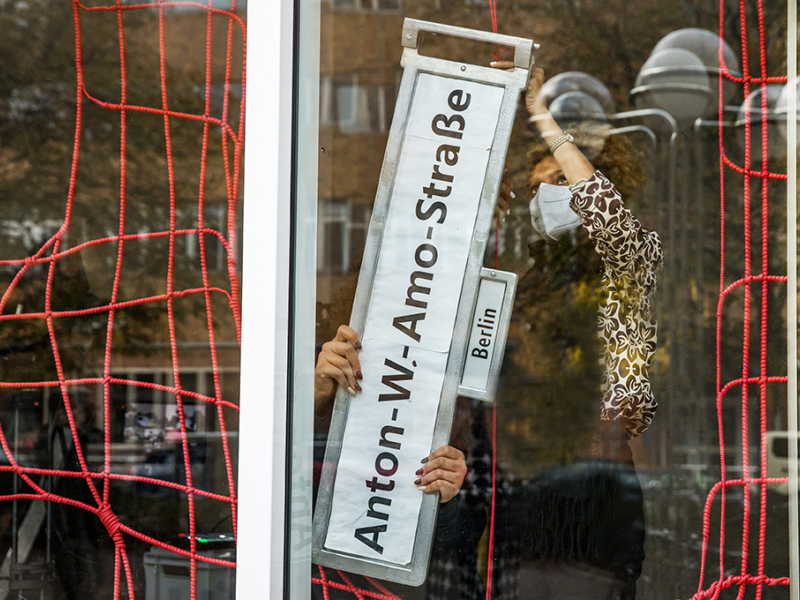Seema Syeda on the materiality of anticolonial resistance
German colonialism and its enduring impacts have long been hidden from public discourse. Dekoloniale, a cultural project that seeks to critically deal with the history of colonialism and its consequences, is challenging this erasure. Led by communities at the forefront of anticolonial resistance, the project seeks to resurface the invisibilised history of empire and campaigns for justice for those impacted by its violence.

The material history of German colonialism is spread across the city of Berlin and remains entangled – through buildings, objects, human remains and memories of trauma – with other parts of the world. Berlin Postkolonial e.V., an organization that forms part of the Dekoloniale project, led a walking tour and workshop in Berlin for participants of European Alternative’s Youth Movement and Campaign Accelerator Bootcamp, to raise awareness about this past and the continuing resistance to its consequences.
Anton Wilhelm Amo Strasse
The tour started at Anton Wilhelm Amo Strasse, a site of symbolic victory for the decolonial movement. This street used to be called ‘Mohrenstrasse’, drawing from the racist term ‘Mohren’, used to describe people with Black and African heritage in the colonial era. Germany was involved in the slave trade in the 16th and 17th centuries and owning black bodies, usually by forcibly deporting people to Europe as slaves and servants, was seen as a sign of power among white society. At the time the area around Anton Wilhelm Amo Strasse was inhabited by German nobility who often kept servants obtained in this way. As it was common for black people to be seen on this street, authorities gave it the racist name ‘Mohrenstrasse’ in the 18th century. Thus black bodies were used by the German empire to showcase their colonial power to the outside world.
Now, after campaigning and pressure from the Black Lives Matter movement, civil society organisations and a petition signed by 14,000 people, the street has been renamed after philosopher Anton Wilhelm Amo. Amo was brought to Berlin as a child slave from what is now Ghana in 1707. Anton studied law and wrote a thesis entitled The Rights of Blacks in Europe, now lost. The renaming of the street signifies the beginning of the German state’s acknowledgment of the enduring legacy of colonialism, the violence of which continues to be reified in the architecture of the city to this day.
Following its involvement in the slave trade, Germany later established colonies in East, West and central Africa including present-day Burundi, Rwanda, Namibia and Tanzania. German rule was characterised by brutal genocide, deportation and resource exploitation.
Searching for human remains
Our tour guide Mnyaka Sururu Mboro, from Tanzania and founder of Berlin Postkoloniale e.V., had relatives who still remembered the horrors of this time, for whom acknowledgement and apology alone does not equate to justice. Mboro told us how his grandmother recalled the brutal killings of her local chieftain and other members of her tribe, with bodies and bones being transported back to Germany for show or for ‘anthropological research’. These human remains were kept in Berlin, with no humanity accorded to the remains themselves or to the families whose loved ones were brutally killed. To this day, the remains have not been returned to their families, and for Dekoloniale, the process of campaigning and negotiating for their return is an ongoing battle. Thousands of bones originating from former German colonies remain archived in the Berlin-based Prussian Cultural Heritage Foundation.
Mboro told us of countless instances and sites across Berlin where colonial history and violence took place, but the evidence remains buried out of sight. Despite reluctance and outright resistance from state and local government, Dekoloniale managed to fund the installation of some plaques and information boards in key locations highlighting elements of that history, from the 19th-century colonial exhibition and ‘zoo’ in Treptower Park, where over a 100 Africans were deported for exhibition from former colonies, to Bismarck’s Berlin Africa conference of 1884, where European powers divided up Africa amongst themselves for resource and labour exploitation.
The work of Dekoloniale is far from complete. It is a complex project just to convince institutions and authorities to acknowledge the brutal colonialism ingrained in their own history and foundations, let alone for reparations to be made. While small steps have begun through the renaming of streets, the reclaiming of objects stolen and hoarded in the European museum and the general raising of awareness, justice for centuries of European colonialism can only really begin when stolen wealth and resources are returned, and the power and systems of oppression built across centuries are dismantled.
Seema Syeda is communications officer at European Alternatives.
Dekoloniale is engaged in a wide range of cultural anticolonial projects. Visit www.dekoloniale.de for more information.